
A view of Royal City, a project developed by Vingroup. — Photo vinhomesmartcitytaymo.vn
Given the recent strong gains of many real estate stocks, experts said that there is still room for rallies, but investors need to carefully consider before taking new long positions.
NDN shares of Danang Housing Investment Development and TIG of Thang Long Investment Group soared more than 20 per cent in a month, while in the past two months, ITC shares of Investment and Trading of Real Estate, DIG of DIC Group, API shares of PEC Investment, and IDJ of IDJ Investment climbed by 40-80 per cent.
In the second half of 2022, the real estate stock group tumbled due to declining liquidity, tight credit capital, bond funds and mobilised funds from customers.
The rally waves of realty stocks usually come at the end of the economic cycle or at the end of the stock market’s bullish cycle, Bui Van Huy, director of HCM City Branch at DSC Securities Corporation, told tinnhanhchungkhoan.vn.
Real estate stocks have currently entered the medium-term recovery wave in the long-term downtrend, but the wave usually lasts three to six months, according to Huy.
As the recent wave started in early March, it may last until the beginning of the third quarter. However, investors who open new long positions should consider them carefully because business results are unlikely to improve.
If investors want to invest in real estate equities at this time, they should select companies based on financial status, product sector, project development ability, and land fund.
"At this stage, there will be many potential risks if you follow the strong increase in real estate stocks. Other businesses can recover faster when there is economic stimulus, but real estate is sluggish and takes longer," Huy added.
"However, this group has great potential in the medium and long term. Stock prices remain appealing once the worst news has been totally digested and gradually more supporting measures have been implemented."
Meanwhile, Le Duc Khanh, director of the Investment Capacity Development Department of VPS Securities Company, recommended that investors focus on stocks whose basic values are assessed and choose typical stocks to invest in.
In fact, the market contains speculative elements, so there are times when cash flows are injected without reflecting the fundamentals, according to Khanh.
Therefore, investors need to carefully scrutinise to be able to decide when to trade short-term, medium-term, or long-term.
According to WiGroup's statistics, in the first quarter of 2023, the residential real estate industry recorded a net profit growth of 72.7 per cent year-on-year.
However, the growth driver of the whole industry only came from Vinhomes (VHM), which accounted for nearly 90 per cent of the industry's profit. If excluding VHM, the total profit of enterprises is only VND718 billion (US$30.6 million), down 72.3 per cent over last year.
In addition, during the period, the total value of inventory and construction in progress of residential real estate businesses decreased by only 3.8 per cent, the prepayment of buyers decreased by about 6 per cent over the previous quarter.
Therefore, the real estate stock group’s recent rally waves are most likely thanks to the pushing up of speculative cash flows, based on information such as cooling interest rates, some policies to support the real estate market, and a technical recovery after the previous strong correction.
The reversal trend in stocks has not been based on a change in the nature of the industry, so investors need to recognise this to avoid unrealistic expectations.
Potentials and risks
Trinh Thanh Can, CEO of Kafi Securities Company, said that the realty stocks group would continue to attract cash flows in the near term, with the expectation of benefiting from the policies to remove legal difficulties, support the bond market, or moves of the State Bank to lower operating interest rates.
However, according to Kafi Securities, interest rates and credit are the great risks of the industry. The change in interest rates and difficulties in accessing capital may affect investment and development of real estate projects.
Property developers are expected to have difficulty raising finance and collaborating with banks. On the demand side, rising interest rates make homebuying difficult owing to higher capital costs and decreased financial capability. This has an impact on the profitability of commercial real estate firms. VNS